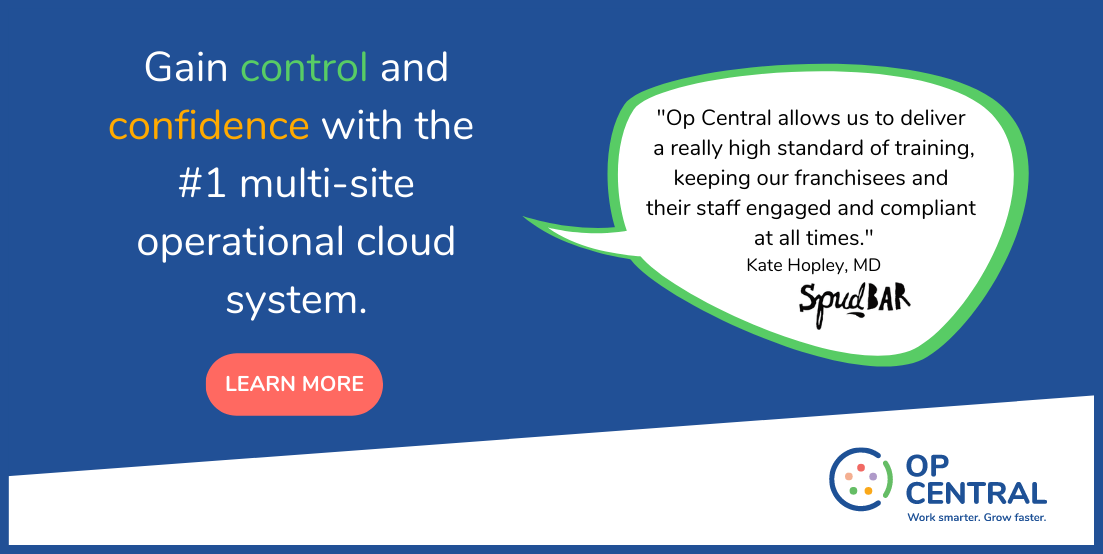

Op Central helps you achieve operational excellence by providing you with control and confidence.
Join the thousands of multi-site organisations reducing complexity with a single point of truth solution to ensure product, brand and customer experience consistency, manage compliance and drive revenue outcomes.
Used in 37 countries by many of Australia’s most trusted hospitality and QSR brands, such as The Cheesecake Shop, Fonda, Spudbar, Degani, La Porchetta, Rashays, Milky Lane and more, Op Central delivers peace of mind with Australia’s most comprehensive and easy to use operations, training and compliance management software platform.
To schedule a live demo, visit Op Central today.
4 simple steps towards greater quality control today

Gain control and efficiency without sacrificing speed and income.
Speed of service often takes precedence over quality for quick-service restaurants (QSRs). In order to turn a profit, fast food chains have to move large quantities of product quickly and efficiently. This can lead to shortcuts in the quality control process.
However, these shortcuts can have serious consequences, like food contamination or damaging the restaurant's reputation. QSRs are still responsible for the safety and quality of their food, even if it is made quickly.
Quality control is critical with customers’ heightened awareness around safety post-COVID, coupled with Australia’s exceptionally high food standards set by Food Standards Australia New Zealand (FSANZ).
There are ways to gain control and efficiency without sacrificing service speed and your bottom line.
How to improve QSR quality control
1. Establish clear standards and procedures
This is the first and most important step. Without clear standards and procedures, it will be difficult to ensure that food is being prepared safely. QSRs should develop standard operating procedures (SOPs) for all aspects of food preparation, including cooking, handling, and storage. These SOPs should be developed in consultation with a qualified food safety professional.
2. Communicate these standards to all staff
Once standards and procedures have been established, it’s important to communicate them to all staff. Staff should be trained in food safety procedures and be aware of the quality standards that have been set.
Sue Foley, Head of Growth, Op Central, said that business owners need to take communication seriously.
"It’s imperative that these standards are cascaded down through the business and that everyone understands their role in maintaining them. The whole team needs to be on board," she said.
3. Conduct regular audits
Regular audits are an important part of quality control. These audits can be conducted internally or by an external body. Either way, they should be conducted regularly to ensure that standards are being met.
Before the pandemic, The Cheesecake Shop had been using Op Central's compliance software to conduct regular audits of their franchisees. This helped them to ensure that their standards were being met and that their food was safe. At the height of COVID-19, however, the company switched to conducting virtual audits, as a way of reducing face-to-face contact.
The Cheesecake Shop were able to adapt their audits to the new normal and continue to ensure the quality of their food. Visits to franchisees' premises are now only conducted if there are concerns about safety and quality. When it came to compliance, Op Central's software helped the company to make the transition to virtual audits seamless.
4. Reporting
Reporting is another important part of quality control. All businesses should have a system in place for reporting food safety issues. This could be as simple as a paper-based reporting system or an electronic system.
Whichever system is used, it should be accessible to all staff and easy to use. This will help to ensure that any issues are reported quickly and dealt with efficiently.
Conclusion
Quality control is essential for all QSRs to ensure their food is safe, and customers are happy with the quality of their food.
Establishing clear standards and procedures, communicating these standards to all staff, conducting regular audits, and having a reporting system in place are just some of the simple steps that businesses can take to improve quality control.
"Whenever you’re looking to make changes in your business, it’s important to have a clear understanding of what you want to achieve," Foley said. "This will help you to put the right systems and processes in place to achieve your goals."
According to Foley, compliance and quality are non-negotiables for any QSR. "The risks are just too high to not take these issues seriously," she said. "Customers need to be able to trust that businesses are taking the necessary steps to keep them safe."
Op Central helps QSRs to manage compliance and improve quality control. The software is used by some of the world's leading QSRs, including The Cheesecake Shop, Fonda, Spudbar, and Degani.
For more information about Op Central, visit their website or book a live demo with them today.
Other Articles

3 tips for bulk recruiting holiday staff

8 ways to maintain clear and consistent standards for QSR success

3 recruitment challenges and what QSRs can do

How The Cheesecake Shop is taking compliance to the next level

Employee engagement: The difference between a good and a great QSR

7 ways to successfully integrate new tech in your QSR business

Staying compliant in a constantly changing regulatory environment

Auditing QSR sustainability and why it matters for customers
